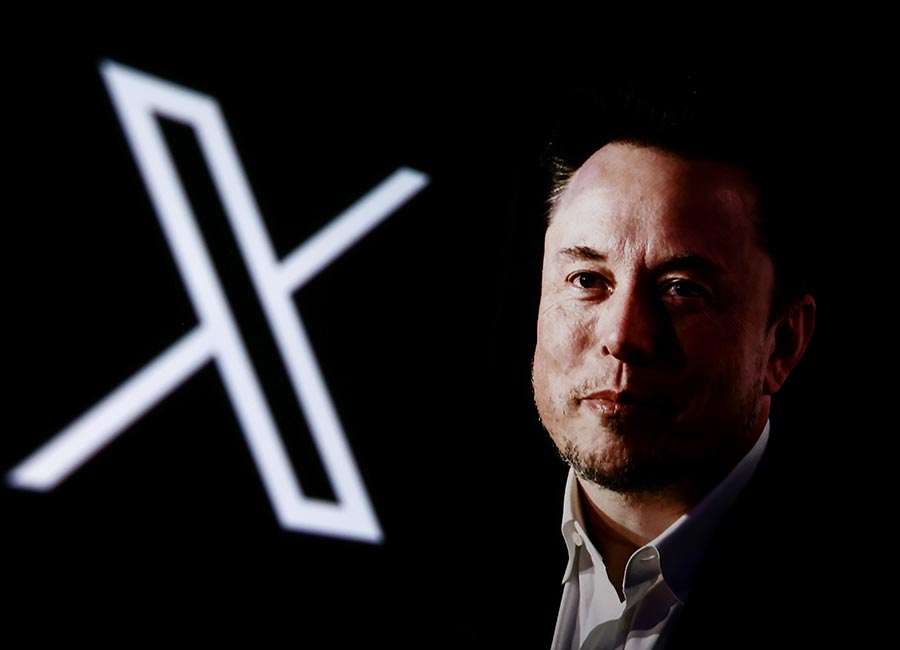If there is one resolution that the news media needs to make for 2025 it is to go cold turkey and withdraw from its selfdestructive dependency on X, writes Ian Burrell.
This social platform is used by 1.8m people in Ireland and only a quarter of Britons but has for too long held disproportionate influence over the news-gathering process.
Now, under Elon Musk's politically motivated ownership, it seeks to strangle the legacy media which fed and nurtured it.
When Jack Dorsey founded Twitter (now X) in 2006, the platform was instantly seductive to journalists.
They loved its immediacy and their egos were massaged by offers of blue tick verification and the opportunities to grow their personal brands.
Other media sectors moved to the site in lock-step and, crucially, so did Westminster.
The platform was suited to faster news production.
Sources could be found via its direct message function.
As many publishers resorted to endless clickbait stories to increase digital traffic, Twitter became their content engine.
A single celebrity tweet could generate a rash of articles.
Pieces could be knocked up from reactions of anonymous Twitter users to a reality TV show or an incident in a football match.
Today, Musk is in charge of the platform and traditional news sources are disappearing from view due to changes in the algorithm.
Some outlets, including The Guardian and American public broadcaster NPR, have quit the site, as have thousands of individual journalists.
Yet, still X makes the news. On Boxing Day, Nigel Farage used the network to post a video of him claiming that Reform had overtaken the Conservatives in party members.
Musk, his political ally, amplified the post to his 209 million followers, commenting: "Change is coming."
An infuriated Tory leader Kemi Badenoch jumped on X to write a thread, accusing Reform of fiddling the numbers.
The row subsequently made its way onto Sky News and the front pages of the Financial Times, The i Paper, The Daily Telegraph and The Times. Yes, it was a good story.
But the outcome was exactly what Farage and Musk would have planned for. Since the world's richest person bought Twitter in 2022 and renamed it X, he has been turning it into his political megaphone.
Musk is the most-followed user of the site and its algorithm ensures his posts habitually appear unsolicited at the top of feeds.
Having used X to champion Donald Trump's re-election and secured himself a role with his new administration, Musk deploys the platform to promote authoritarian leaders he likes, such as Italy's Giorgia Meloni.
He backs Germany's far-right AfD party and denounces regimes he disapproves of, deeming the UK a "tyrannical police state" on the verge of "civil war".
He uses X to undermine professional journalism. "The legacy media wants to destroy your right to freedom of speech", he tweeted.
By this year, news sites had seen traffic referrals from X fall 27 per cent as the platform reduced their profile. It stripped verification from journalists who refused to pay and put blue ticks on general sale. Musk frequently tweets to X users: "You are the media now."
He complains that media commentators predicted failure at Tesla and SpaceX but both have enjoyed endless positive coverage.
According to Kate Conger and Ryan Mac, authors of Character Limit: How Elon Musk Destroyed Twitter, "Musk's craving for narrative control" is what drives him.
He is nothing if not visionary. In 1998, when Google was weeks old, he predicted that the internet was the "be-all and end-all of media" and that everything from print to radio would be "folded into" it.
But you don't have to be Nostradamus to see that Musk is bad for news.
American writer Oliver Darcy said last year that relations between newsrooms and this "hate-drenched platform" would "become even more untenable" in 2024.

He was right. Despite Musk's claims to be building a "digital town square" for free speech, X frequently censors stories critical of his political friends. He suspended a journalist from X over a story on Trump's running mate JD Vance.
Rival social networks, such as Bluesky and Meta's Threads, are yet to generate the user scale to match X's energy.
Many journalists are reluctant to leave Musk's platform and abandon the stage to disinformation.
But the news sector must wean itself off its habit of using one man's political mouthpiece as its go-to source for finding stories.
The fact is that X is stagnating in its public appeal.
More people in the UK now get their news from TikTok, and even more from WhatsApp and YouTube. Musk might be worth €440bn but that does not give him the right to define the truth.
Photo: Elon Musk. (Photo by Beata Zawrzel/NurPhoto via Getty Images)











